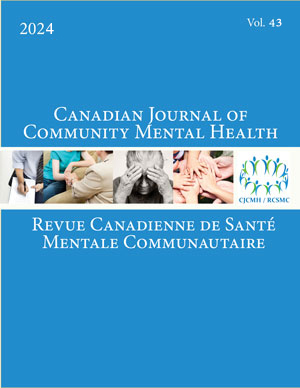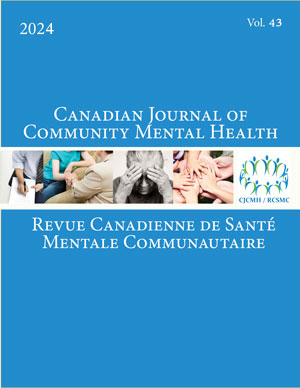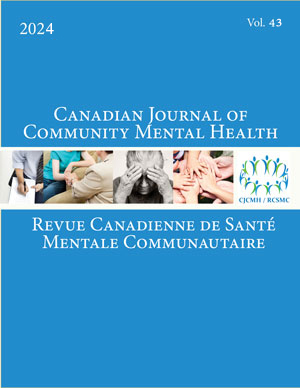Volume 1 • Number 2 • September 1982
OPEN ACCESS
A national survey was conducted to determine current opportunities for graduate education in community psychology in Canada. The results show expanded offerings for academic and field work education in community psychology in the past decade. Also, faculty perceptions of the goals, activities, and adequacy of training in community psychology were obtained. Finally, similarities and differences between graduate education in community psychology in Canada and the U.S. are noted. Issues related to the development of community psychology in Canada are discussed.
OPEN ACCESS
There is substantial concensus regarding the professional roles derived from theoretical models of community psychology. Community field training is necessary for graduate students to experience fundamental role characteristics and develop applied skills relevant to later community practice. A doctoral-level internship and its relationship to professional roles in community psychology is described. Problems associated with development of community internships are discussed from the perspective of both the sponsoring graduate program and the student. Given the importance of understanding Canadian issues, systems, and polices for community practice, it appears highly desirable that graduate students do their internships in Canada.
OPEN ACCESS
The paper identifies and examines some of the economic, political, religious and social structures created by the dominant white culture and their effects on the mental well-being of the Cree and Ojibwa people residing in Northwestern Ontario. Two major clusters of problems are identified: (i) community power-loss and disenfranchisement and (ii) the establishment of norms which diminish the identity and self-esteem of native persons. Actions which deal with both kinds of power-loss are suggested. The range of goals for these activities include more effective integration, cross cultural considerations and native control over community and resource development. Important functions are identified for community psychologists in program and community assessment and development, public education and advocacy.
OPEN ACCESS
A rationale for the development of rural community psychology in Canada is presented. It focuses on salient issues and basic characteristics of Canadian rural communities. Principles for an applied model emphasize the importance of cultural and linguistic identities, knowledge of rural value systems, an informed approach to change, and utilization of current strengths and resources. Implications for practice include characteristics of rural community psychologists, the need for peer supports, roles and decision-making, coping with bureaucracy, intergroup relations, and ethical problems.
OPEN ACCESS
This article draws on conceptions from community psychology to examine possible roles for psychologists in the criminal justice system. While psychologists have been involved for some time in providing individual assessment and treatment, the author suggests alternative interventions which primarily focus on institutional or system level change. Following presentation and discussion of a conceptual framework, the author reviews a number of examples of interventions, in such areas as pretrial diversion, bail reform, fitness to stand trial, corporate violence, and the police.
OPEN ACCESS
This paper describes a resource exchange program between two human service organizations: a public school board and a university. This case study illustrates the utility of the concept of resource exchange as a response to pressures for the effective management of limited human resources. With an emphasis on mutual goals, needs, and strengths, the resource exchange program expanded resources available to both organizations. For the public school board, new services in the form of primary, secondary, and tertiary prevention programs were developed. For the university, research and training opportunities were created. Finally, the fragmentation between and within the organizations was reduced in correspondence with their increased mutual interdependence.
OPEN ACCESS
The community mental health ideology is closely identified with deinstitutionalization and community psychology in its efforts to maintain as many people as possible in their natural environments. One frequently used means of evaluating the success of the community mental health movement is the examination of recidivism rats and average length of stay per patient admitted to psychiatric facilities. Examination of both U.S. and Canadian rehospitalization statistics has shown a population at risk of frequent rehospitalization. This “treatment resistant” group threatens the perceived effectiveness of the community mental health movement because of its impact on the recidivism measure. The revolving door population presents for service a multiplicity of problems that are of two basic varieties: psychiatric symptoms and social/vocational deficits. Descriptions and explanation of the services required to address these problems are presented. Issues of co-ordination, evaluation and system self-correction are discussed in relation to the seven service functions identified as necessary for improving the community tenure of this marginally functional population. Implementation issues that include key assumptions that must be adhered to by systems personnel, likely failure points in the planning of comprehensive mental health systems, and practicalities of manpower recruitment are discussed. Suggestions for the goals and strategies of the planning of comprehensive service systems for the revolving door population are presented.
OPEN ACCESS
After-care programmes for ex-mental patients in the mental health system lack an integrated, community approach. Some programmes neglect the concrete problems in community living ex-mental patients experience, others neglect the intrapersonal difficulties encountered in returning to community life. The psycho-educational approach described in this paper is a practical theory unifying the development of essential interpersonal and intrapersonal competencies. The basic therapeutic method is the problem-posing dialogue in which learner and teacher develop the learner's potential to be a productive individual. After reviewing after-care services. I discuss the three guiding principles of psycho-education: maximum consumer involvement, the unity of internal and external change, and in vivo intervention. Then I identify the critical therapeutic skills demanded and indicate the appropriate type of programme evaluation.
OPEN ACCESS
The barriers to community psychology experienced in community mental health setting are discussed and suggestions made for alleviating professional frustration and for shaping organizational systems. It is suggested that professional associations should take a stronger role in supporting individual psychologists and in taking a public advocacy role.
OPEN ACCESS
The structure of community psychology has been dominated historically by American influences. Canadian community psychologists have no organized voice and work primarily in geographic and professional isolation from one another. A national survey was conducted to determine the feasibility of establishing a supportive communication network. Socializing factors such as demographic characteristics, training, employment settings, activities, and goals were examined, as were interrelationship factors framed as a series of potential organizational steps. One hundred forty-five respondents, predominantly young. Canadian trained psychologists, were identified. There were several significant relationships between various socializing factors. Respondents enthusiastically endorsed initiation of a newsletter, informal directory, national conference, and CPA special interest group. Problems associated with creating a national network are discussed.










